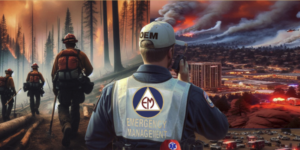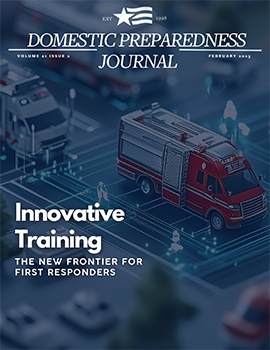
Editor’s Note: Maximize Training, Minimize Risk
Catherine L. Feinman
February 26, 2025
The December 2024 edition of the Domestic Preparedness Journal provides insight into the intersection of AI and emergency preparedness. With their exponentially increasing speed of development, existing, emerging, and not-yet-created technologies must all be part of the planning process in 2025 and beyond.

Emergency Management has Evolved: Why the All-Hazards Era is Over
Chas Eby
February 26, 2025
While initially useful, the term “all hazards” no longer accurately describes the functions or mission of the emergency management discipline. The current generation of emergency management has moved beyond all hazards to become “hazard agnostic.”

Elevating Law Enforcement Training Standards
Richard Schoeberl and Anthony (Tony) Mottola
February 26, 2025
Training standards ensure that all law enforcement officers receive a consistent level of knowledge and skills to perform their jobs safely and effectively. One training model incorporates “pracademic” professionals and garners trust from practitioners as well as academics. Its integration of theory and practice sets a training standard that can be applied industry-wide.

In Memoriam: Lynda Zambrano
Domestic Preparedness
February 26, 2025
Advisor Lynda Zambrano’s legacy is far-reaching, and the Domestic Preparedness community will miss her and her contributions deeply.

Advisory Board Spotlight: Interview with Sadie Martinez
Sadie Martinez
February 19, 2025
Sadie Martinez is on the advisory board for the Domestic Preparedness Journal. Sadie is the Colorado State Division of Homeland Security and Emergency Management’s Access and Functional Needs Coordinator. Sadie uses the Communication, Maintaining Health/Medical, Independence, Support Services and Safety, and Transportation (CMIST) resource framework, which provides a whole-community inclusion approach to identify the actual resource needs of a community. She sat down with Journal Marketing Coordinator Nicolette Casey to share her passion for her work.

Elevating Healthcare Emergency Preparedness Exercises with Realistic Patient Simulation
Kathryn Romanchuk and Ben Kobliner
February 19, 2025
Overlooked until disaster strikes, many emergency management departments struggle with personnel and budgetary constraints, yet the demand placed on these departments continues to increase. Nevertheless, hospitals and health systems need to be prepared, and full-scale exercises are a comprehensive method for achieving this preparedness.

Back to the Basics: Navigating Crisis Leadership
Andrew Pence
February 19, 2025
From historic catastrophes to today’s challenges, crises pose significant public threats. By returning to the basics and prioritizing deliberate preparation, organizational leaders can build greater resilience, enhance performance, and lead effectively when it matters most.

Imagining the U.S. Without Power: A Dual-World EMP Exercise
Charles (Chuck) L. Manto, K. Luke Reiner and Dave Hunt
February 12, 2025
A dual-world tabletop exercise simulating an electromagnetic pulse event in Chicopee, Massachusetts, revealed startling discrepancies in outcomes between the city’s current preparedness and a moderate-preparedness simulation.

The Forefront of Innovation in Training & Exercises: Disaster Gaming
Arthur J. Simental
February 12, 2025
Disaster wargaming may significantly change the future of tabletop exercises in emergency management and homeland security. Long used effectively to win and prevent wars throughout history, wargaming offers more realistic and engaging scenarios for emergency managers to prepare for real-world disasters.

U.S. Withdrawal from the World Health Organization: Emergency Preparedness Implications
Tanya M. Scherr
February 12, 2025
As the U.S. contemplates withdrawing its membership from the World Health Organization, there are potential impacts on both local and global emergency preparedness and response to consider. Emergency managers should evaluate their current programs to determine ramifications in their local sectors.


